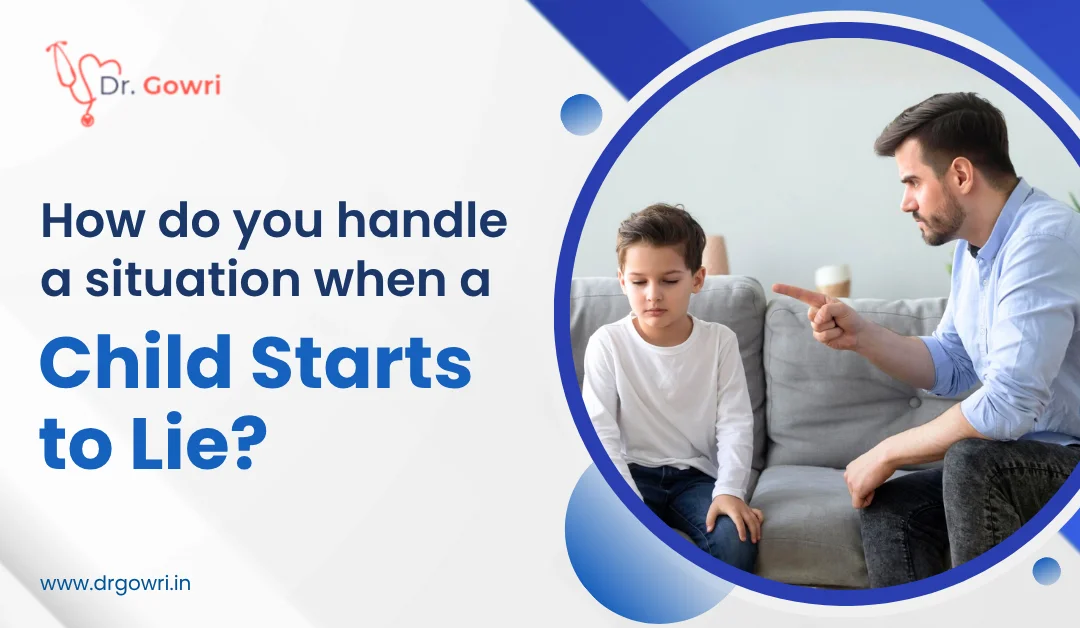Lying is the most simple form of self-defense.
— Susan Sontag
Lying is a common thing seen in children, somewhere it can be considered a natural part of child development. It can be that they either want to avoid a consequence or say what comes to mind, even if it’s not true. While occasional lying can be harmless and tolerated, but persistent lying behaviour in children can be a real worry and might affect the trust and relationships of the child.
First Things First: Understand the “Why” Behind the Lie
Lying behaviour in children can be because of many reasons, some of which may include-
i) Avoiding Punishment:
This is probably the most common reasonIf your kid thinks they’ll face severe consequences for their actions, they might see lying as the better way to go.
ii) Protecting Themselves:
This is similar to avoiding punishment. Maybe they’re worried about disappointing you or being seen as “bad.” Sometimes, lying is a way to protect their self-esteem.
iii) Gaining Attention or Approval:
Kids crave attention, even if it’s negative attention. Lying can be a way to grab your attention and make themselves feel important. They might even be trying to impress their friends with a fancy story.
iv) Testing Boundaries:
Kids are constantly testing boundaries, and lying is just another way to see how far they can push things. They might be curious about what they can get away with.
v) Copying Behaviour:
Kids learn by observing the adults around them. If they see you telling little lies, like for example., “saying you’re not home when you are”, they might think it’s acceptable behaviour.
Okay, Know That You Know “Why”. Let’s Look Into What Can Be Done?
Now that you have a better understanding of why your kid lied, for you to act accordingly. Here’s a breakdown of some strategies:
- Stay Calm and Composed: Reacting with anger or yelling will likely just shut your kid down and make them less likely to be honest in the future. Instead, take a deep breath and try to approach the situation with a calmness.
- Create a Safe Space for Honesty: Make it clear that you value honesty and that you want your child to feel comfortable telling you the truth, even when it’s difficult. Let them know that you understand that mistakes happen and that you’re more interested in helping them learn from their mistakes than in punishing them.
- Empathize and Validate Their Feelings: Try to understand their perspective and their feelings. For example, if they lied about finishing their homework because they were feeling tired, you could say “I understand that homework can be tough, and it’s okay to feel tired sometimes. But lying isn’t the way to deal with it.”
- Explain the Consequences of Lying: Help your child understand the impact that lying can have on others. Explain that lying can damage trust, hurt feelings, and make it difficult for people to believe them in the future. Discuss the importance of honesty in building strong relationships.
- Read Books or Watch Shows About Honesty: There are so many great books and TV shows that deal with the topic of honesty in a kid-friendly way. Use these as a starting point for conversations about the importance of telling the truth.
- Model Honesty Yourself: This is probably the most important thing you can do. Kids learn by watching the adults around them. Be honest in your own interactions, even when it’s difficult. Avoid telling white lies.
- Praise Honesty: When your child is honest with you, even when it’s difficult, be sure to praise them for their honesty. This reinforces the idea that honesty is being valued.
Age Matters: Tailoring Your Approach
It’s also important to consider your child’s age and developmental stage when addressing lying.
i) Toddlers (Ages 2-3):
At this age, kids are still learning the difference between fantasy and reality. Their “lies” are often more about imaginative play. Gently correct them and help them understand the difference between what’s real and what’s pretend.
ii) Preschoolers (Ages 4-5):
Preschoolers are starting to understand the concept of lying, but they may not fully grasp the consequences. They might lie to avoid punishment or to gain attention. Focus on explaining the importance of honesty in simple terms and praising them when they tell the truth.
iii) School-Aged Children (Ages 6-12):
School-aged children are more aware of the consequences of lying and are more likely to lie intentionally. It’s important to tell the reasons for their lying and to help them develop problem-solving skills so they can deal with difficult situations.
iv) Teenagers (Ages 13+):
Teenagers are complex beings with a lot of things going on around them. Their reasons for lying can be varied, from avoiding punishment to protecting their privacy. It’s important to have open and honest conversations with them about the importance of trust and the consequences of lying.
When to Seek Professional Help
While occasional lying is normal, there are some situations where it might be a sign of a more serious problem. Consider seeking professional help if:
- Your child is lying excessively and consistently.
- Their lying is causing significant problems in their relationships or at school.
- They are lying about serious things, such as theft or violence.
A therapist or counselor can help you understand the underlying causes of your child’s lying and develop strategies for addressing it.
On a concluding note,
Dealing with a child who lies can be frustrating, but it’s important to remember that it’s a normal part of development but remember, a little patience and understanding can go a long way! You’ve got this! Good luck!
About the Author

Dr. Gowri Ravi Chinthalapalli is a Developmental and Family Physician with over 16 years of experience in child development and family medicine. She has treated more than 50,000 patients worldwide. After completing her MBBS from Rajiv Gandhi University of Health Sciences, she pursued MRCGP from the UK and gained wide experience in primary care and emergency medicine. She also holds a Fellowship in Child Development from the Centre for Child Development and Disabilities, Bengaluru. Dr. Gowri currently practices at Aster CMI Hospital and Canara Diagnostic Centre, Bengaluru. She is passionate about guiding families, supporting children with developmental needs, and providing holistic care.

